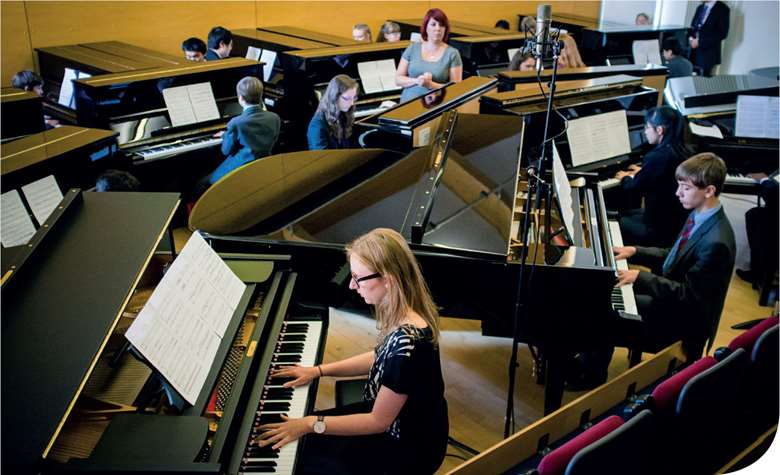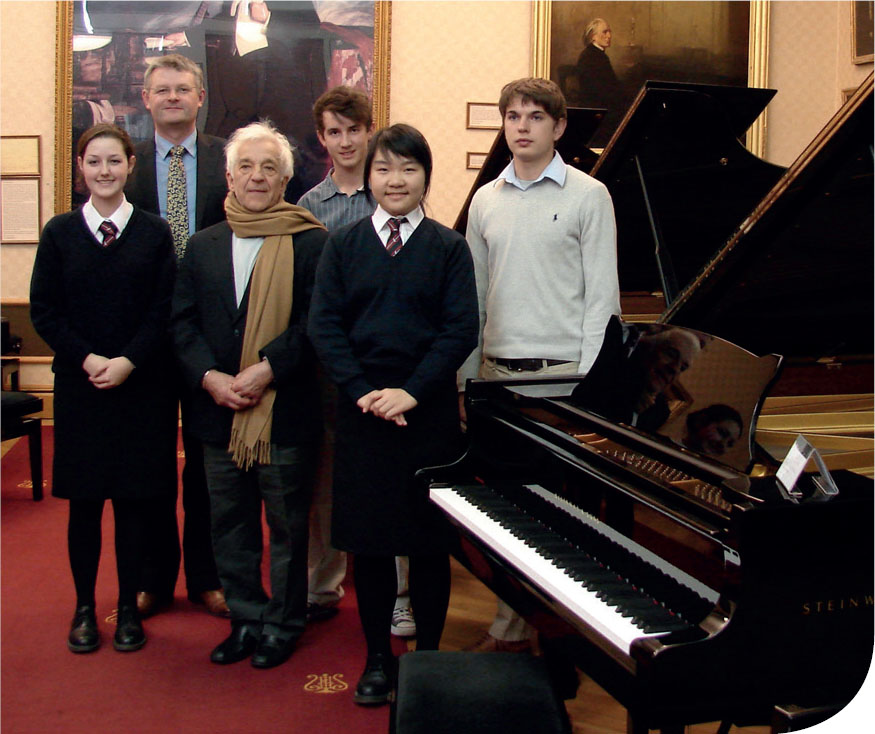The keys to success: The Steinway schools programme
Eleanor Philpot
Sunday, December 1, 2019
Providing musical enrichment opportunities and industry-standard pianos, the Steinway schools programme allows schools across the country to develop their students’ talent. Eleanor Philpot hears from Keith Glazebrook, the UK manager of the programme

Year on year, more and more schools are added to an illustrious list that sees their students playing some of the best pianos in the world. While it may seem to those unfamiliar with the programme that these institutions have been cherry picked through some secret process, when I speak with Keith Glazebrook, the UK manager of the Steinway school programme, he explains that it always begins quite simply.
‘Usually a school has a piano or pianos that need updating, so I go down and speak to the director of music and meet the senior manager team. I talk about the value of a relationship with Steinway – the key to it is that if you become a Steinway school, particularly in the case of an independent school or university, your recruitment increases and that more than pays for the price of the pianos. Ultimately it's never our decision, we simply go to every school and talk about the range of what we offer.’
What is it about Steinway & Sons pianos that make them a favourite for so many institutions? ‘They enable you to become a better musician,’ Glazebrook says. ‘A Steinway shows the slightest mistakes right away because it's an incredibly broad-ranging sound. If you accidentally play a note a little too hard you will hear it, so that reveals where your potential for improvement is. It's the teachers who like the pianos more than the students. Often teachers can spot that someone has an ability but they're not able to make the best of it because the piano can't cope. It's hiding their mistakes, or it's limiting their technical ability. If a school doesn't have instruments that enable a student's progression it can stifle them.’
More than just instruments
It is this idea of musical enrichment, of bettering students’ playing regardless of level, that's at the heart of what Steinway provides for schools – whether it's a matter of helping heads of department choose a piano that will suit students’ abilities (a narrower tonal range for early players and a wider tonal range for conservatoire level) or providing in-depth masterclasses. The latter sees Steinways artists leading one-on-one workshops with Steinway schools’ top pupils at Steinway Hall, the company's London showroom, while 30 of their classmates are given a guided tour and even shown around the service centre.
‘We ask [pianist and Steinway & Sons UK ambassador] Charles Owen to come in [to Steinway Hall] for the afternoon and he'll offer a masterclass to four students from four different schools,’ says Glazebrook. ‘Rather than teach them how to play the piano, he tends to teach them how to control a performance instrument. It's a completely different way to approach playing music, which is excellent as it doesn't conflict with what students are learning from their teachers. The masterclasses can take a student's playing to a whole other level; it can completely change their attitude towards performance.’
The affiliation with Steinway not only sees schools travelling to London to participate in masterclasses but also sees highly regarded artists visiting the Steinway schools themselves. This aspect of the programme has greatly benefitted the music department at Stowe school in Buckinghamshire, which has been able to host performances by leading performers – in turn raising the reputation of the school's music department.
‘We had the Russian National Orchestra visit us back in 2014 for the opening of our new music school,’ says Ben Andrew, head of keyboard at Stowe, calling me from his office at the end of another busy day in the music department. ‘We even had some Stowe pianists play piano concertos with them – it was amazing!’
For Stowe, the positives of the programme go beyond putting on impressive concerts in the school hall. Andrew tells me how having Steinway grand pianos has allowed their students to engage in richer musical experiences, particularly in the studio.
‘Because of our affiliation with Steinway, we also have regular lunchtime concerts and can make excellent recordings. Several of our students have been signed by record labels such as Parlophone. Having industry-standard equipment in the recording studio, combined with beautiful instruments such as Steinway pianos, really makes a difference to the quality of music that we can produce.’

Pangbourne College students enjoying a masterclass with Vladimir Ashkenazy
Reaching out further
Due to limited funding, a glimmering set of Steinway grands is not an achievable goal for many state schools. However, Steinway offers an affordable leasing programme that enables schools with a limited budget to enjoy top-quality pianos, from around £50 a month for an upright. ‘Although you would need a Steinway grand to become a Steinway school, if someone wants an association with Steinway and wants to begin with a renewal programme, we can start at very low costs and can build up,’ says Glazebrook.
Inclusivity is also crucial to the company's future plans; it one day hopes to offer masterclasses and performances to a wider range of schools than it is currently able to reach. Using its all-Steinway institutions as a base, it could potentially reach schools that are not able to travel down to London. Glazebrook comments, ‘A lot of our schools want to reach out to the local community and say, “Get involved in our music making.” They aren't exclusive about what they do.’
The future could also see Steinway offer a programme it is currently trialling with the Royal Welsh College of Music and Drama. This would involve schools that have no affiliation with Steinway touring the factory in Hamburg, allowing students to observe the different stages that go into making a piano.
Despite the mystique that has surrounded it, the Steinway schools programme is doing all it can to ensure more and more schools have access to excellent instruments while providing a rich learning experience. ‘The most important thing for us,’ says Glazebrook, ‘is to give as many as people as possible the opportunity to understand what we do.’

